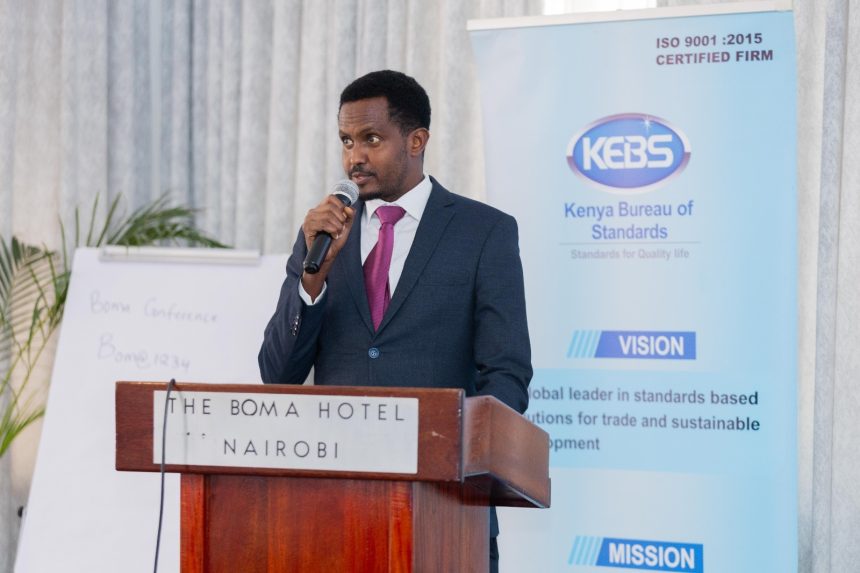Kenya took center stage in the global fight for sustainable water solutions as it hosted the 2nd International Workshop of the ISO Technical Committee 224, Working Group 8 (ISO TC224/WG8), focusing on onsite domestic wastewater management.
The event, organized by the Kenya Bureau of Standards (KEBS), brought together industry leaders, policymakers, and global experts to exchange ideas and explore solutions to the pressing challenge of sustainable wastewater management.
Speaking during during the forum, KEBS Director of Finance and Strategy, Adan Mohammed who was representing KEBS Managing Director Esther Ngari, underscored the importance of international collaboration in advancing wastewater management practices.
He highlighted the workshop’s alignment with the United Nations Sustainable Development Goal 6 (SDG 6), which focuses on ensuring clean water and sanitation for all.
“This forum has demonstrated how innovation and international cooperation can address local and global challenges, positioning wastewater management as a key pillar of sustainable development,” Mohammed said.
Standards Paving the Way
A significant theme of the workshop was the role of international standards in transforming wastewater management.
KEBS showcased its contributions to global solutions, including ISO 24521 and ISO 24525, which provide practical frameworks for managing and maintaining onsite domestic wastewater systems in diverse contexts.
“These standards are not just technical guides; they are transformative tools that bridge the gap between innovation and real-world application,” noted Jane Maina of KEBS. “They ensure that sustainable practices are scalable and effective across different environments.”
The workshop also featured ground-breaking technologies and solutions in wastewater management. One key highlight was the use of biological agents to reduce methane emissions, a significant driver of climate change.
“Nature offers solutions to some of our most critical challenges,” said Daniel Wanjuki, Director of Ecosave. “Biological agents are proving to be pivotal in reducing the environmental impact of wastewater systems.”
Eng. Lucy Wanjiku, Director of Ecocyle, emphasized the potential of Sequencing Batch Reactor (SBR) technology to address Kenya’s unique wastewater management needs. “Technology must align with the cultural and behavioral patterns of the communities it serves,” she said, while advocating for public awareness to drive adoption.
Another area of focus was decentralized sanitation systems, which were hailed as transformative for urban informal settlements. “These systems restore dignity, improve public health, and uplift vulnerable communities,” said Nancy Ngao, highlighting their societal and environmental impact.
The workshop came at a time when Kenya faces significant water challenges, including a projected 30% shortfall in water supply by 2030.
Despite these obstacles, the country is emerging as a global leader in sustainable wastewater solutions. From biodigesters generating energy from wastewater to advanced onsite systems, Kenya’s circular economy approach is turning waste into a valuable resource.
“Wastewater is not waste—it’s an opportunity,” said Prof. Gerryshom Munala, Convenor of ISO TC224/WG8. He praised Kenya’s proactive stance in leveraging innovation and collaboration to tackle its unique challenges.
Hosting the global workshop underscored Kenya’s commitment to setting benchmarks in wastewater management while addressing its local realities.
Delegates commended the nation’s efforts to integrate robust standards, foster partnerships, and raise public awareness to ensure long-term solutions.
Call to Action
Participants issued a rallying call for action while emphasizing the need for robust policies, sustained partnerships, and increased public engagement to ensure the adoption of sustainable wastewater management practices.
“This gathering reinforced Kenya’s role as a global leader and a source of innovative solutions for the world,” said Prof. Munala.
Delegates were also encouraged to explore Nairobi’s cultural and natural landmarks, including Nairobi National Park, symbolizing the country’s balance between urban growth and environmental conservation.
Mohammed reaffirmed KEBS’ commitment to driving sustainable wastewater management. “Today’s discussions have highlighted the transformative power of standards and collaboration in building a cleaner, greener future for all,” he concluded.





